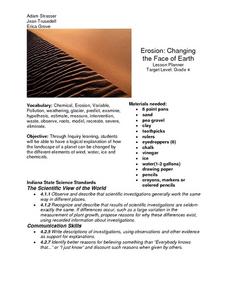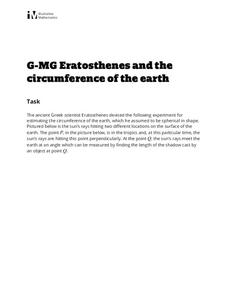Curated OER
Earth's Hydrologic Cycle
Students examine the water cycle. In this hydrologic cycle lesson, students follow the provided procedures to demonstrate the how water moves around the planet through the dynamics of the water cycle.
Curated OER
Gross Motor Development
Fourth graders participate in a game reflecting the solar system, stars, and rockets. They simulate how space invaders move and hit stars and rockets. They discuss how scientists study the stars and planets.
Curated OER
Antarctica
Students explore why Antarctica is so important to the planet. They investigate the physical characteristics. Students create their own unique treaty of governance for Antarctica and discuss how laws are enforced in Antarctica.
Curated OER
Daisyworld: Stella Mac or PC
Students investigate Daisyworld, a very simple planet that has only two species of life on its surface - white and black daisies, and bare ground. They construct a Stella model of Daisyworld and perform guided experiments to explore the...
Curated OER
Are Nanobacteria Alive: Sample Socratic Questions
Students comprehend the definition and uniqueness of life and its complexities. They examine what characteristics constitute a living organism. Students recognize the extent of the role nanobacteria play in the movement and molding of...
Curated OER
Navigating a Spacecraft
Students work with a partner to plot the trajectory of a spacecraft traveling between Earth and Mars in the 2018 and returning in 2020. They examine the key factors when planning a mission to and from Mars such as travel time, distances...
Curated OER
Erosion: Changing the Face of Earth
Fourth graders explore how the landscape of the planet can be changed by different elements of wind, water, ice and chemicals through hands-on activities. They examine pictures of areas around town and discuss anything they think is out...
Curated OER
Earth, Moon, Mars Balloons
Students demonstrate size and orbits of Earth, Moon, and Mars. In this space science lesson plan, students will use balloons to show how the size and distance between the planets and satellite compare.
Curated OER
Continent Adventure
Students review or learn information regarding the 7 continents on our planet. It is also a fun movement and fitness activity.
Curated OER
How High Does the Atmosphere Go?
Pupils explain how relatively thin the atmosphere is, compared to the size of the planet, and determine the relative extent of the four major atmospheric layers.
Curated OER
A Multicultural Study: Chinese New Year
Learners study the customs and beliefs of the Chinese people as they experience Chinese New Year; students become aware that they live on one planet but their festivals and holidays vary.
Curated OER
Where No Student Has Gone Before
Students create a story about an unknown planet invaded by humans as a pre-reading activity for the novel, A Wrinkle In Time. They discuss good versus evil, and identify examples of the theme good vs. evil in books, film, and their own...
Curated OER
Solid Waste and Our Natural Resources: Utilizing the Story THE LORAX
Young scholars gain an introduction to our planet's solid waste problem and our personal responsibility in curbing and solving said problem through the use of Dr. Seuss' book, The Lorax. After hearing the book, class discussion follows.
Curated OER
Discoveries of Titanic Proportions
Young scholars analyze various statements on the moon. After reading an article, they discuss the findings about a new moon around Saturn. In groups, they re-create a press conference in which the new findings were released to the...
Curated OER
Exploring Our Solar System #1
Students examine the different theories on how our solar system was formed. They discover the order of the nine planets. They also identify the surface features of each planet.
Curated OER
Art Across the Planet
Students create drawings of their own homes and those that they imagine might be found in a foreign country, conduct research on that particular foreign country using exchange artwork and questions with another group of students in that...
Curated OER
Understanding Our Planet's Food Web
Sixth graders, in groups, examine how humans have a tenuous position as part of an ecosystem.
Curated OER
Sunspots or Lumpy Planets
Students examine the method Galileo used to prove sunspots were actually on the sun instead of objects between the Earth and Sun.. They study the term foreshortening and assess its relevance to observation.
PBS
Breaking it Down
After challenging themselves to correctly choose the form of erosion and length of time required for a given landform to develop, earth science class members model mechanical and chemical weathering with various lab demonstrations over...
Delaware Law Related Education Center
Comparing Personal and Civil Responsibility in Croatia and The United States
What rights do citizens in a democracy have? Learners compare the rights of citizens in the United States and Croatia, and examine the personal and civil responsibilities that go along with those rights through a great series of...
Illustrative Mathematics
Eratosthenes and the Circumference of the Earth
The class gets to practice being a mathematician in ancient Greece, performing geometric application problems in the way of Eratosthenes. After following the steps of the great mathematicians, they then compare the (surprisingly...
Illustrative Mathematics
Tilt of Earth's Axis and the Four Seasons
Geometry meets earth science as high schoolers investigate the cause and features of the four seasons. The effects of Earth's axis tilt features prominently, along with both the rotation of the earth about the axis and its orbit about...
NASA
Pop! Rockets
Off they go — launching rockets is fun. The lesson plan contains templates to build paper rockets that can be launched from a PVC pipe launcher. Individuals or groups build the rockets and determine the shapes for their fins. Included...
University of Colorado
The Jovian Basketball Hoop
A radio receives radio signals, converts them to an electrical signal, then converts this signal to a sound signal, and amplifies the sound so people can hear it. Class members use this information to create a short-wave radio antenna...

























